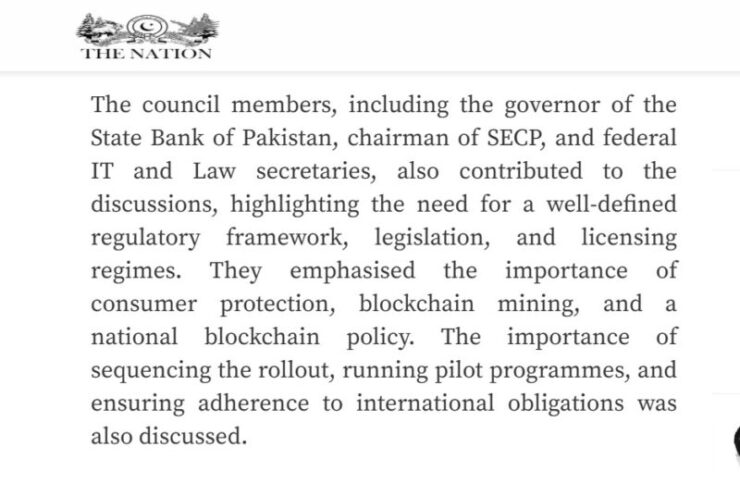Bilal Bin Saqib, CEO of Pakistan’s Crypto Council, has formally proposed repurposing the country’s surplus energy output to power Bitcoin mining operations. The proposal was presented during the council’s inaugural meeting on March 21, attended by key government and financial sector officials, including the Governor of the State Bank of Pakistan, the Chairman of the Securities and Exchange Commission, and senior lawmakers.
“This is the beginning of a new digital chapter for our economy. We are committed to building a transparent, future-ready financial ecosystem that attracts investment, empowers our youth, and puts Pakistan on the global map as a leader in emerging technologies,” Saqib said.
The meeting also focused on broader regulatory considerations, with council members advocating for the development of a clear legal framework for cryptocurrencies. According to local reports, the council’s long-term vision includes attracting foreign direct investment and positioning Pakistan as a competitive player in the global crypto economy.
The proposal marks a noticeable shift in tone from Pakistan’s previously restrictive stance on digital assets. Just last year, former Finance Minister Aisha Ghaus Pasha publicly declared that cryptocurrencies would not be legalized in Pakistan, citing concerns tied to anti-money laundering compliance and Financial Action Task Force (FATF) guidelines.
By contrast, the newly formed Crypto Council appears intent on carving out a regulated space for crypto-related activities—beginning with Bitcoin mining—as a potential avenue for economic growth.

Pakistan’s Crypto Pivot
Pakistan’s emerging openness toward Bitcoin mining appears to align with a broader global shift, particularly following recent regulatory developments in the United States. Late last year, Pakistan moved to recognize cryptocurrencies under a regulated framework, marking a significant policy reversal after years of skepticism.
The shift coincided with major political changes abroad. On the same day as the U.S. presidential elections in November 2024, Pakistan signaled its intent to regulate digital assets, while in the U.S., Donald Trump’s re-election ushered in a wave of pro-crypto policies. Shortly after his inauguration, President Trump signed an executive order establishing the Working Group on Digital Assets, aimed at overhauling federal crypto regulations and prohibiting the development of a central bank digital currency (CBDC).
In March 2025, Trump further advanced the crypto agenda by creating a Bitcoin strategic reserve and a digital asset stockpile focused on cryptocurrencies issued by U.S.-based firms.
Pakistan’s Crypto Council has referenced these global developments as part of its case for legalizing Bitcoin mining. While regulatory uncertainty persists domestically, council leaders argue that adopting crypto-friendly policies—particularly in areas like energy-based Bitcoin mining—could position Pakistan competitively alongside countries embracing digital asset innovation.
Quick Facts:
- Pakistan’s Crypto Council proposed using surplus energy to power Bitcoin mining operations.
- The proposal was presented at the council’s inaugural meeting attended by top government and financial officials.
- The council advocates for a clear regulatory framework to attract foreign investment and position Pakistan in the global crypto market.
- The move signals a shift from Pakistan’s previous anti-crypto stance, which cited anti-money laundering and FATF compliance concerns.





